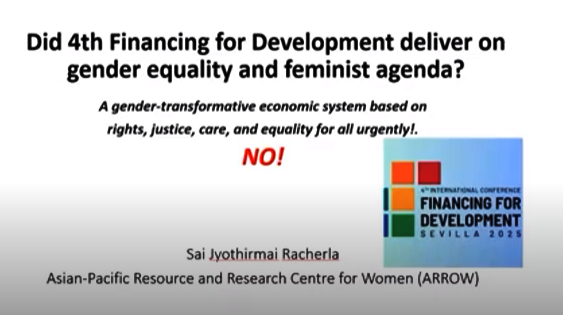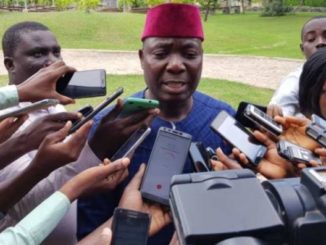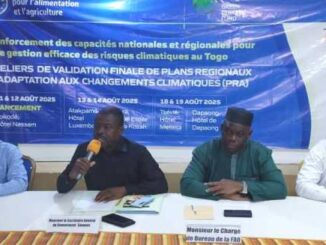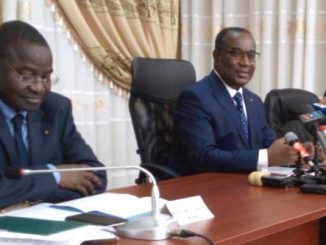
The 4th International Conference on Financing for Development (FfD4), recently held in Seville, Spain, failed to address the financing challenges needed to achieve the United Nations’ Sustainable Development Goals (SDGs), according to experts who spoke at the SHE & Rights (Sexual Health with Equity and Rights) event in July 2025.
The outcomes of FfD4 did not succeed in influencing decisions on taxation, debt, trade, aid, and public financing, which could have had an impact on the lives of women, girls, youth, and all diverse gender groups.
According to Shobha Shukla (Feminist leader and SHE & Rights coordinator), FfD4 failed to restructure the global economy in an equitable way. It reduced women and girls to mere « economic potentials » for profit.
« FfD4 considered women and girls as mere ‘economic potentials’ for ‘economic benefits,’ without truly addressing the fundamental obstacles to gender justice, including labor rights, safeguards against corporate abuses, and the prevention of gender-based violence in the workplace, » said Ms. Shukla.
Focused on the theme « Did the 4th International Conference on Financing for Development deliver on its promises for gender equality and the feminist agenda? », the SHE & Rights session was organized ahead of the 13th International AIDS Society Conference on HIV Science (IAS 2025) and the UN High-Level Political Forum 2025 (HLPF 2025), a meeting where Shobha was the only main speaker on SDG 3.
The Feminist Forum brings hope for change.
« The feminist agenda refers to a gender-transformative economic system that is based on the rights to justice, care, and equality for all in an urgent manner. This was a central point of the Feminist Forum’s Political Declaration held before FfD4 in Seville, Spain. But FfD4 failed to implement gender equality and the feminist agenda, » said Sai Jyothirmai Racherla, Deputy Executive Director of the Asian-Pacific Resource and Research Centre for Women (ARROW).
She recalled that the final FfD4 document was a watered-down version of the vision and ambition of the Action Agenda adopted at the 3rd International Conference on Financing for Development (FfD3) in Addis Ababa, Ethiopia (2015).
The indispensable right to sexual and reproductive health
For Mabel Bianco, a medical activist from Latin America and founding president of FEIM (Foundation for Studies and Research on Women), the document is weak.
« For example, it mentions access to universal health coverage but not to sexual and reproductive health. Yet, this is what we desperately need, as it is not possible to achieve the SDGs if these rights are not recognized, including access to safe abortion, » noted Ms. Bianco.
For her part, Lidy Nacpil (Coordinator of the Asian Peoples’ Movement on Debt and Development, APMDD) emphasized that there was a lack of transparency throughout the FfD4 negotiation process.
« The accountability of the process was absent, and restrictions on civil society participation that continued—and even worsened—during the FfD4 conference in Seville were major obstacles, » said Lidy Nacpil.
Spaces for civil society are shrinking and closing
Zainab Shumail from the Asia-Pacific Forum on Women, Law and Development (APWLD) reported that there were many restrictions and limited access.
« We couldn’t bring in resources, publications, or reports that we had worked hard to produce by gathering evidence of our lived realities on the ground in the nations of the South. Such incidents at FfD4 communicate a feeling of being under surveillance, restricted, and censored. We were also limited in our access to the room to dialogue with governments, » she lamented.
False solutions
For Shereen Talaat, founder and director of the Middle East and North Africa Feminist Movement for Economic, Development and Ecological Justice (MENA Fem Movement), FfD4 betrayed the rights of women, the feminist agenda, the people, and our planet. Additionally, under the guise of the « Seville Action Platform of FfD4, » the conference presented 130 initiatives that were false solutions.
« Only 4% of official development assistance (ODA) had gender equality as a primary objective. Less than 1% reaches feminist and women’s rights organizations. UN Women has highlighted a significant annual funding gap of US$420 billion needed to achieve gender equality in developing countries. The FfD4 document is not progress, but a step backward, » added Ms. Talaat.
« The focus on intersectionality and highlighting the link between finance, development, human rights, and gender equality were key advocacy agendas for us leading up to and around FfD4. We strongly hoped that the FfD4 negotiation process would reflect this—but in practice, we found that there was a separation of gender equality and human rights from conversations about climate debt and fiscal justice, » said Swetha Sridhar, senior global policy researcher at Fos Feminista.
Experts agreed that FfD4 failed to meet the needs of the South. They specifically pointed out that issues of debt, taxation, and trade are closely linked to the feminist agenda for reproductive and social justice. However, the conference separated these topics, showing a disconnect between financial discussions and human rights.
« We are not going to stop until we achieve gender equality. We will continue our work to demand an economic model based on rights, that is ecologically just, decolonial, intersectional, sustainable, and person-centered, international and multilateral development banks, » concluded Sai Jyothirmai Racherla of ARROW.
Ambroisine MEMEDE



